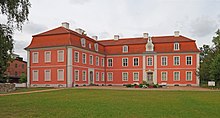Gans zu Putlitz
Appearance
You can help expand this article with text translated from the corresponding article in German. (June 2012) Click [show] for important translation instructions.
|


The Gans Edle Herren zu Putlitz (Edle Herren = noble lords, until 1919 a title, it become a part of the official surname with the transformation of most noble titles into surname elements to be ignored at alphanumerical sorting) is a German noble family belonging to the Uradel ('ancient nobility') of the March of Brandenburg, and was one of the most influential families in the Prignitz region, especially during the Middle Ages. The first documentary reference to the family appears in the reign of Emperor Frederick Barbarossa, in about 1178 with Johannes Gans, titled „baro“ (baron) in the text.[clarification needed]
